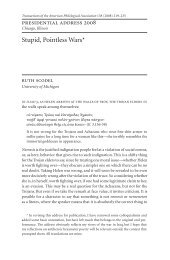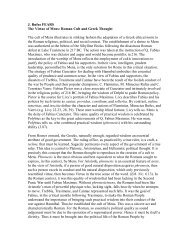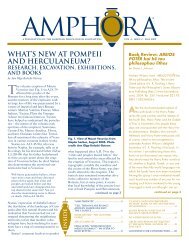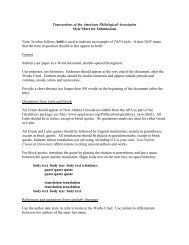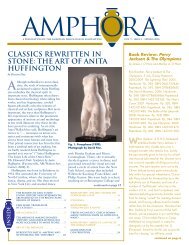Jon SOLOMON The Rosetta Stone, Ptolemaic Aetos, and Aida The ...
Jon SOLOMON The Rosetta Stone, Ptolemaic Aetos, and Aida The ...
Jon SOLOMON The Rosetta Stone, Ptolemaic Aetos, and Aida The ...
Create successful ePaper yourself
Turn your PDF publications into a flip-book with our unique Google optimized e-Paper software.
the three previous <strong>Ptolemaic</strong> kings after Alex<strong>and</strong>er the Great, but before it mentions even<br />
Alex<strong>and</strong>er's name it lists the name of the priest of Ptah [sic], <strong>Aetos</strong>, <strong>and</strong> his father, also<br />
<strong>Aetos</strong>. <strong>The</strong> feminine form of the Greek name Aetus is Aeta, the feminine form of the<br />
Demotic name is Aiata, <strong>and</strong> these may have been Mariette's inspiration for the name<br />
<strong>Aida</strong>.<br />
Mariette discusses the name only in his letter to Du Locle (April 27, 1870).<br />
Don't be alarmed by the title. <strong>Aida</strong> is an Egyptian name. Normally it would be Aita. But<br />
that name would be too harsh, <strong>and</strong> the singers would irresistibly soften it to <strong>Aida</strong>.<br />
Neither De Locle, nor Verdi, nor anyone other than an Egyptologist would know if Aita<br />
were not an authentic Egyptian name, but a famous Egyptologist trying to please his<br />
Egyptian employer would hardly not use an Egyptian name for his titular protagonist. So<br />
far as I have been able to discover, nothing like the name Aita is attested in any ancient<br />
Egyptian texts, <strong>and</strong> a contemporary Egyptian Arabic name would hardly qualify. From<br />
Mariette's perspective Aeta/Aiata/Aita was an Egyptian name, albeit derived from a<br />
<strong>Ptolemaic</strong>, i.e. Greek-Egyptian name, found on the <strong>Rosetta</strong> <strong>Stone</strong>.<br />
In Diodorus Siculus' description of Egypt [1.19], a source Mariette consulted for its<br />
passages describing the Serapeum, the name Aetus is equated with the Nile <strong>and</strong> all of<br />
Egypt, which thereby not only gives <strong>Aida</strong> an additional imprimatur of authenticity but<br />
also transforms her into a historical symbol for the entire Nile region. <strong>The</strong> title of<br />
Mariette's original scenario was not "<strong>Aida</strong>" but "La fiancée du Nil," <strong>and</strong> the name of the<br />
"King of Egypt" was intentionally left historically unspecified, as were the names of<br />
Radames, Ramfis, <strong>and</strong> Amneris, rendering the entire tale without historical specificity<br />
<strong>and</strong> therefore open for a more allegorical interpretation.



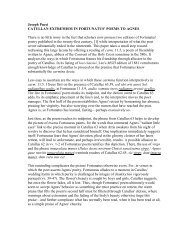
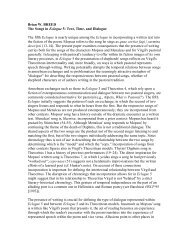
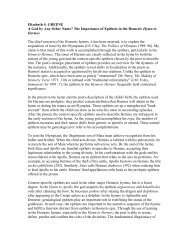
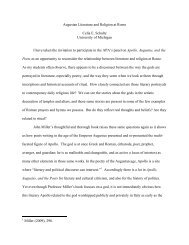
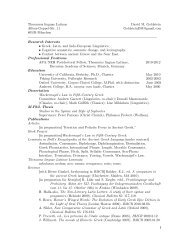
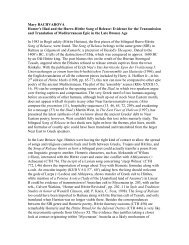
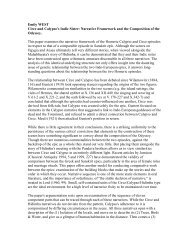
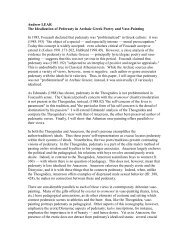
![John H. STARKS, Jr. [vo]cales vultus:Pantomime Actresses in Latin ...](https://img.yumpu.com/11930335/1/190x245/john-h-starks-jr-vocales-vultuspantomime-actresses-in-latin-.jpg?quality=85)
